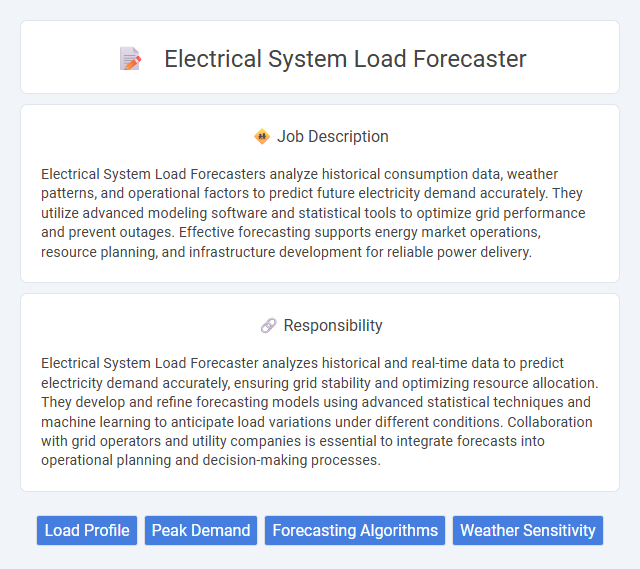
Electrical System Load Forecasters analyze historical consumption data, weather patterns, and operational factors to predict future electricity demand accurately. They utilize advanced modeling software and statistical tools to optimize grid performance and prevent outages. Effective forecasting supports energy market operations, resource planning, and infrastructure development for reliable power delivery.
Individuals with strong analytical skills and a background in electrical engineering or data science are likely well-suited for an Electrical System Load Forecaster role. Those comfortable working with complex data models and performing detailed energy consumption predictions might find this job aligns with their strengths and interests. However, candidates who struggle with quantitative analysis or lack attention to detail may face challenges in meeting the demands of this position.
Qualification
Electrical System Load Forecaster positions require a strong background in electrical engineering or energy management, with expertise in load forecasting models and data analysis techniques. Proficiency in statistical software, machine learning tools, and experience with SCADA systems enhances predictive accuracy and system reliability. Candidates should possess strong analytical skills, knowledge of power system operations, and the ability to interpret weather and consumption data to optimize load forecasting outcomes.
Responsibility
Electrical System Load Forecaster analyzes historical and real-time data to predict electricity demand accurately, ensuring grid stability and optimizing resource allocation. They develop and refine forecasting models using advanced statistical techniques and machine learning to anticipate load variations under different conditions. Collaboration with grid operators and utility companies is essential to integrate forecasts into operational planning and decision-making processes.
Benefit
The Electrical System Load Forecaster role likely offers significant benefits including enhanced decision-making capabilities through accurate energy demand predictions, which can lead to improved grid reliability and cost savings. Professionals in this position may experience career growth opportunities by developing expertise in advanced forecasting technologies and data analytics. The job also probably provides a sense of contribution to sustainable energy management and operational efficiency.
Challenge
The Electrical System Load Forecaster position likely involves the challenge of accurately predicting future electricity demand amid fluctuating consumption patterns and variable renewable energy outputs. This role probably requires managing complex data sets and integrating weather, economic, and usage trends to minimize forecasting errors. Navigating these uncertainties could be critical for ensuring grid stability and optimizing resource allocation.
Career Advancement
An Electrical System Load Forecaster plays a pivotal role in predicting electricity demand using advanced data analysis and machine learning models, enabling efficient power grid management. Mastery in forecasting technologies and energy market dynamics can lead to career progression into senior analyst, grid operations manager, or energy consultant roles. Continuous skill development in AI-driven forecasting tools and regulatory knowledge enhances promotion prospects within utility companies and energy firms.
Key Terms
Load Profile
Electrical System Load Forecasters analyze and predict load profiles by examining historical consumption patterns, weather data, and peak demand trends to optimize power generation and distribution. Accurate load profile forecasting ensures grid stability, efficient energy allocation, and cost reduction for utility companies. Advanced modeling techniques like time series analysis and machine learning enhance the precision of load forecasts, enabling proactive infrastructure management.
Peak Demand
An Electrical System Load Forecaster specializes in predicting peak demand periods to ensure grid reliability and optimize energy resource allocation. Accurate peak demand forecasting enables utility companies to prevent outages, manage generation costs, and coordinate demand response programs effectively. Utilizing advanced statistical models and real-time data analytics, the forecaster supports strategic planning for infrastructure expansion and operational efficiency.
Forecasting Algorithms
Electrical System Load Forecaster specializes in developing and implementing advanced forecasting algorithms to predict energy demand with high precision. These algorithms utilize machine learning models, time series analysis, and real-time data integration to optimize load predictions and improve grid reliability. Accurate load forecasting enables efficient energy distribution, reduces operational costs, and supports sustainable grid management.
Weather Sensitivity
Electrical System Load Forecasters analyze historical consumption data alongside meteorological variables such as temperature, humidity, and wind speed to predict energy demand accurately. Weather sensitivity modeling enables refined load forecasts by quantifying how variances in climate conditions influence electricity usage patterns throughout different regions and timeframes. Advanced forecasting algorithms integrate real-time weather inputs and predictive climate models to optimize grid operations and enhance energy resource management.
 kuljobs.com
kuljobs.com